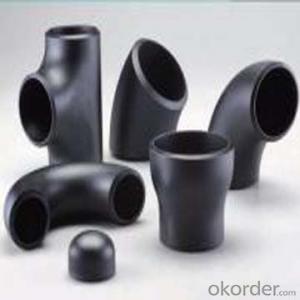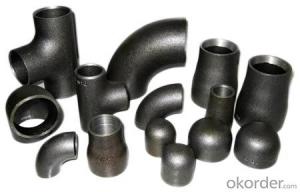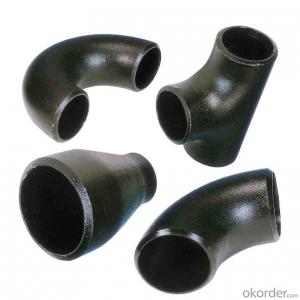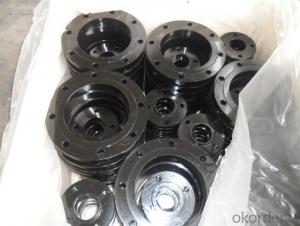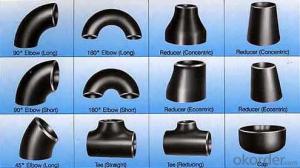CARBON STEEL PIPE FITTINGS ASTM A234 TEE
- Loading Port:
- Tianjin
- Payment Terms:
- TT OR LC
- Min Order Qty:
- 1 m.t.
- Supply Capability:
- 30000 m.t./month
OKorder Service Pledge
OKorder Financial Service
You Might Also Like
Specifications
1.we produce seamless steel pipe
2.size:48-219*4.5-45mm
3.ISO 9000 approved
4.Market:south/east Asia,Mid-east,South America
seamless steel pipe
Material J55 K55 N80 L80 P110.etc
Standard ASTM JIS
Usage conveying oil gas ,oil pipe line,pipe material collar,oil nature gas,
Packing wooden cases or wooden pallet ,export standard package
Others:Special design available according to requirement
Anti-corrosion available and high temperature resistence
Delivery time 30days
Payment term T/T L/C
Name | API oil casing pipe | ||||
Out Diameter | Wall thickness | Material | Thread | Length | |
in | mm | ||||
5 1/2 | 139.7mm | 6.20 | J55/K55/N80 | LTC/STC/BTC | R2 |
6.98 | |||||
7.72 | |||||
9.17 | |||||
10.54 | |||||
6 5/8 | 168.28mm | 7.32 | J55/K55/N80 | LTC/STC/BTC | R2 |
8.94 | |||||
10.59 | |||||
12.06 | |||||
12.06 | |||||
8 5/8 | 219.08 | 8.94 | H40 | S/L/B | 9 5/8R2 |
J55/K55 | S/L/B | ||||
10.6 | L80 | L/B | |||
12.7 | L80 C95 | L/B | |||
14.15 | P110 | L/B | |||
9 5/8 | 244.48 | 13.84 | J55 K55 | R2 | |
15.11 | L80 | L/B | |||
10 3/4 | 273.05 | 11.43 | J55 K55 | S/B/E | R2 |
13.84 | P110 | S/B | |||
15.11 | P110 | S/B | |||
11 3/4 | 298.45 | 12.19 | J55 K55 | S/B | R2 |
10.96 | J55 K55 | S/B | |||
13 3/8 | 339.72 | 12.19 | J55 K55 L80 | S/B | R2 |
10.92 | J55 K55 | S/B | |||
13.06 | L80 | S/B | |||
Coupling and thread can be required according to customer requirment
- Q:Can steel pipes be used for offshore oil and gas platforms?
- Offshore oil and gas platforms can utilize steel pipes, as they are known for their durability, strength, and ability to withstand harsh marine conditions. These pipes are typically constructed from high-quality steel alloys, capable of enduring the immense pressures and temperatures of offshore drilling and production activities. Moreover, steel pipes offer versatility and easy welding, facilitating the creation of intricate pipeline networks on offshore platforms. Furthermore, protective coatings like epoxy or anti-corrosion coatings can be applied to steel pipes, bolstering their resistance to corrosion and extending their lifespan in the offshore environment. In summary, steel pipes are a reliable and extensively employed option for transporting oil and gas on offshore platforms.
- Q:Can steel pipes be used for underground cooling systems?
- Indeed, underground cooling systems can make use of steel pipes. Thanks to their durability, strength, and resistance to corrosion, steel pipes are widely employed in numerous applications, including underground cooling systems. They are adept at handling the rigorous demands of cooling systems, such as high pressure and temperature requirements. Moreover, steel pipes can be conveniently installed and maintained by means of welding or threading them together. Nonetheless, it is crucial to ensure that the steel pipes are adequately coated or insulated in order to avert corrosion and uphold heat transfer efficiency.
- Q:Are steel pipes resistant to impact?
- Yes, steel pipes are generally resistant to impact due to their high strength and durability. They can withstand external forces and are less likely to deform or break upon impact compared to other materials.
- Q:Can steel pipes be used for chemical storage tanks?
- Steel pipes can be used for chemical storage tanks, but it depends on the specific application and the type of chemicals being stored. Steel is generally a strong and durable material, making it suitable for many industrial applications. However, certain chemicals can react with steel, causing corrosion and potentially compromising the integrity of the tank. In such cases, it is important to use corrosion-resistant coatings or linings on the steel pipes to protect against chemical reactions. Additionally, the design and construction of the tank should adhere to industry standards and regulations to ensure safe storage of chemicals. Therefore, while steel pipes can be used for chemical storage tanks, careful consideration must be given to the type of chemicals being stored and appropriate measures taken to prevent corrosion and ensure safety.
- Q:What is the difference between steel pipes and concrete-lined pipes?
- Steel pipes are made entirely of steel and are known for their strength and durability. They are commonly used in various applications, including transporting liquids and gases, as well as structural support. On the other hand, concrete-lined pipes are made of steel with a layer of concrete applied to the inner surface. This concrete lining provides additional protection against corrosion and abrasion, making them suitable for transporting corrosive materials or in aggressive environments. The concrete lining also helps in reducing friction within the pipe, resulting in improved flow efficiency.
- Q:What are the environmental impacts of using steel pipes?
- The environmental impacts of using steel pipes include the extraction and processing of raw materials, such as iron ore and coal, which contribute to deforestation, habitat destruction, and greenhouse gas emissions. The manufacturing process also generates significant amounts of waste, including slag and emissions from steel production. The transportation and installation of steel pipes contribute to carbon emissions, while their corrosion and maintenance may result in the release of toxic substances into the environment. Proper waste management and implementing sustainable practices can help mitigate some of these impacts.
- Q:How are steel pipes used in the construction of oil storage tanks?
- Steel pipes are commonly used in the construction of oil storage tanks as they provide strength, durability, and corrosion resistance. These pipes are used to connect various components of the tank, such as the walls, roof, and bottom, ensuring a secure and leak-proof structure. Additionally, steel pipes are also used to transport oil within the tank and for the installation of necessary fittings, valves, and other equipment.
- Q:Are steel pipes suitable for transporting fluids?
- Yes, steel pipes are suitable for transporting fluids. They have high strength and durability, can withstand high pressure and temperature, and are resistant to corrosion, making them ideal for various fluid transportation applications such as oil, gas, water, and sewage.
- Q:What type of steel pipe for security windows?
- Stainless steel security window generally use 25 square tubes and 19 round tubes! 25/38 tubes and 22 round tubes are also available!
- Q:What is the lifespan of steel pipes?
- The lifespan of steel pipes can vary depending on various factors such as the quality of the steel used, the environment in which they are installed, and the maintenance and care they receive. However, typically, steel pipes can last for several decades or even up to a century if properly installed and maintained.
1. Manufacturer Overview |
|
|---|---|
| Location | |
| Year Established | |
| Annual Output Value | |
| Main Markets | |
| Company Certifications | |
2. Manufacturer Certificates |
|
|---|---|
| a) Certification Name | |
| Range | |
| Reference | |
| Validity Period | |
3. Manufacturer Capability |
|
|---|---|
| a)Trade Capacity | |
| Nearest Port | |
| Export Percentage | |
| No.of Employees in Trade Department | |
| Language Spoken: | |
| b)Factory Information | |
| Factory Size: | |
| No. of Production Lines | |
| Contract Manufacturing | |
| Product Price Range | |
Send your message to us
CARBON STEEL PIPE FITTINGS ASTM A234 TEE
- Loading Port:
- Tianjin
- Payment Terms:
- TT OR LC
- Min Order Qty:
- 1 m.t.
- Supply Capability:
- 30000 m.t./month
OKorder Service Pledge
OKorder Financial Service
Similar products
New products
Hot products
Related keywords
